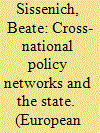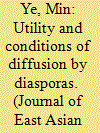| Srl | Item |
| 1 |
ID:
083743


|
|
|
|
|
| Publication |
2008.
|
| Summary/Abstract |
This article challenges optimistic claims about the power of nonstate actors in cross-border policy networks. In a pilot study of two most-likely cases, the article examines the social policy network between the European Union and Poland and Hungary prior to accession. Two dimensions guide the analysis: Whether states act as gatekeepers and whether national borders restrict communications. The article shows that while labor and employers easily communicate with the EU, contacts fail to cut across national borders. Network data show that the EU significantly controls the flow of communication, a fact that runs counter to the notion of networks as fluid entities that enable all actors to link freely with others. Governments and the EU have an interest in network construction and control. Only by tracking network contacts empirically, the article argues, are we able to estimate the capacities and limits of nonstate actors in transnational politics.
|
|
|
|
|
|
|
|
|
|
|
|
|
|
|
|
| 2 |
ID:
123710


|
|
|
|
|
| Publication |
2013.
|
| Summary/Abstract |
A recent trend in policy scholarship is to explain policy changes and paradigm shifts by focusing on the features and interactions of policy networks. This paper aims to contribute to the current literature by exploring how policy networks affect policy paradigmatic change in China with reference to urban housing policy development. It is argued that both exogenous and indigenous factors can be attributed to the difficulties of paradigm replacement. The closed policy network in the housing field delimits the choices of policy instruments and hinders paradigmatic shifts. Contrary to mainstream studies, exogenous shocks are identified as serious handicaps to significant policy changes.
|
|
|
|
|
|
|
|
|
|
|
|
|
|
|
|
| 3 |
ID:
111907


|
|
|
|
|
| Publication |
2012.
|
| Summary/Abstract |
In 2005, the European Parliament rejected the directive 'on the patentability of computer-implemented inventions', which had been drafted and supported by the European Commission, the Council and well-organised industrial interests, with an overwhelming majority. In this unusual case, a coalition of opponents of software patents prevailed over a strong industry-led coalition. In this article, an explanation is developed based on political discourse showing that two stable and distinct discourse coalitions can be identified and measured over time. The apparently weak coalition of software patent opponents shows typical properties of a hegemonic discourse coalition. It presents itself as being more coherent, employs a better-integrated set of frames and dominates key economic arguments, while the proponents of software patents are not as well-organised. This configuration of the discourse gave leeway for an alternative course of political action by the European Parliament. The notion of discourse coalitions and related structural features of the discourse are operationalised by drawing on social network analysis. More specifically, discourse network analysis is introduced as a new methodology for the study of policy debates. The approach is capable of measuring empirical discourses both statically and in a longitudinal way, and is compatible with the policy network approach.
|
|
|
|
|
|
|
|
|
|
|
|
|
|
|
|
| 4 |
ID:
166382


|
|
|
|
|
| Summary/Abstract |
This article investigates democratic performance of policy networks. To shed new light on this topic, the social embeddedness, i.e. social and economic ties of actors in and around policy networks are analysed. A qualitative case study of energy policy networks in Finland is presented. Energy-intensive industries, incumbent utilities and the government are the main actors in policy networks. There are also extensive ties between them. Wind energy developers are formally linked to the networks. However, they have few possibilities to participate in the policy processes or to make an impact on policies. Similarly, representation of the people is poor. Also, the policy debates are not open-ended. Hence, it appears that the policy actors' social embeddedness casts a shadow on the democratic anchorage of the policy networks. Based on these tentative findings, it is concluded that the democratic performance of policy networks should be investigated, not assumed.
|
|
|
|
|
|
|
|
|
|
|
|
|
|
|
|
| 5 |
ID:
147310


|
|
|
|
|
| Summary/Abstract |
Diffusion studies have rightly emphasized external ideas and resources that propel liberalization in the developing world. There remain two gaps: first, the literature has not covered the types of diffusers and the ways diasporas may shape liberalization in their homelands; second, it pays little attention to internal diffusion after national adoption within a country. This article explores the utility and conditions of diffusion by diasporas and examines the roles of diasporas and internal diffusion in China and India's FDI liberalization. In both countries, diasporas were main diffusers that led national adoption of liberalism at home. In China, however, entrepreneurial diasporas' networks with local governments helped expansive internal diffusion. India's professional diasporas did not strongly engage local governments or domestic companies. National adoption in India was followed by reversal and partial internal diffusions. India's software services provide a similar diffusion by diasporas to that in China.
|
|
|
|
|
|
|
|
|
|
|
|
|
|
|
|